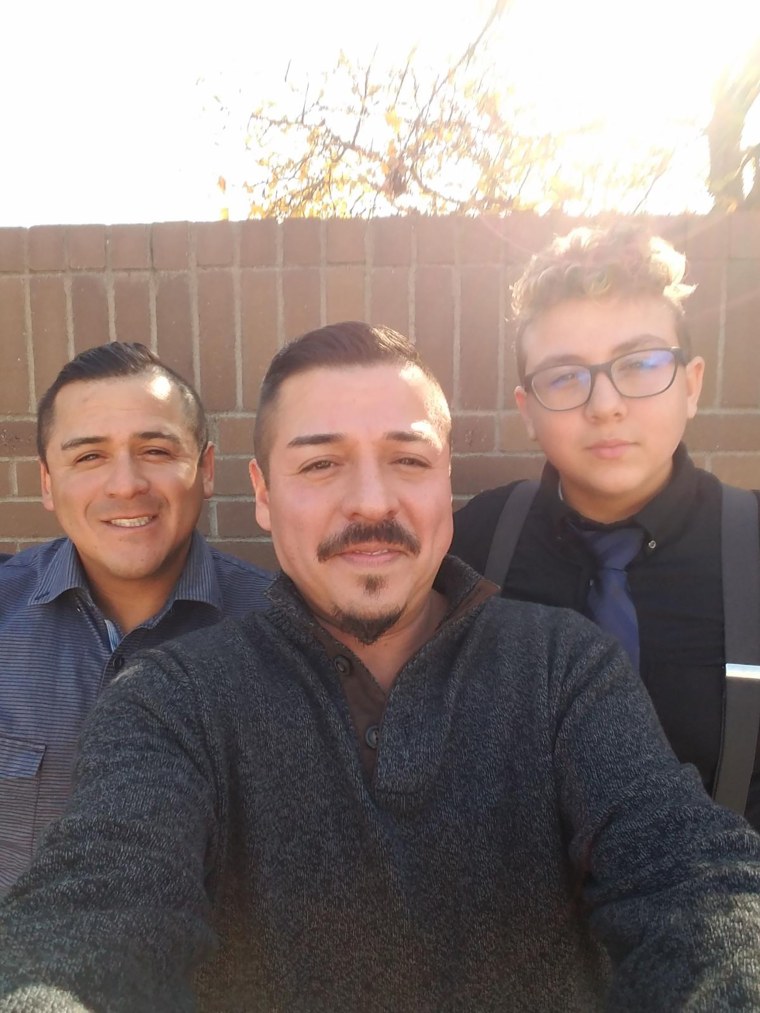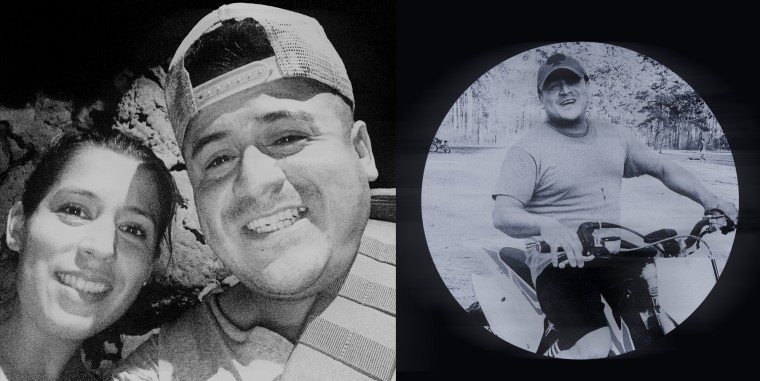The family of Daniel Adrian Barajas would have celebrated his 40th birthday Thursday, but instead they are filing a wrongful death lawsuit against local officials in Arkansas' Saline County.
The federal lawsuit is part of the family's ongoing questions around an encounter Daniel had with sheriff's deputies before he was fatally struck by three vehicles, including a semi-truck, in an Arkansas highway on Jan. 15, 2022.
"We want answers and we want closure," Xexilia and Raquel Barajas, Daniel's sisters, told NBC News in a joint interview Thursday morning. "We miss him so much."
Mike Laux, a national civil rights attorney representing the Barajas family, filed the federal lawsuit against the Saline County sheriff's deputies who interacted with Daniel prior to his death, as well as officials at the Saline County Coroner's Office who investigated the case.
The wrongful death lawsuit — which alleges use of excessive force, violations of due process and racial profiling — was filed Thursday afternoon in a district court in New Mexico, where Daniel resided.
Daniel, a specialty welder who frequently traveled the country for jobs, had finished a gig in West Virginia when he began to drive to Texas to visit his sisters, each of whom had recently given birth.
He was excited to meet his newborn niece and nephew, the sisters said. Daniel had driven through Kentucky and stopped in Arkansas.
Daniel was sleeping in his car, parked in an on-ramp, when he was awakened by Saline County sheriff’s deputies at about 4:35 a.m., according to deputies’ reports cited in the lawsuit.
The deputies questioned Daniel, claiming he seemed disoriented and appeared to be hallucinating, according to deputies’ reports cited in the lawsuit. The deputies brought a K9 unit to smell Daniel's car and emergency medical personnel to check Daniel.
Nothing came back from the K9 unit search and background check, according to the lawsuit. Daniel was also medically cleared by EMTs.
But according to the lawsuit, Daniel wasn't allowed to get back into his car to continue his trip to Texas. Instead, deputies took possession of his car keys.
Daniel's phone, wallet and a metal cashbox he kept in his car for work purposes also went missing the morning the was killed, according to the lawsuit and the Barajas sisters.
Concerns over racial profiling
Laux and the Barajas family joined officials from the League of United Latin American Citizens (LULAC) in Albuquerque, New Mexico, where the group held a press conference on Thursday afternoon during its annual conference.
LULAC, the nation's oldest Latino civil rights organization, believes Daniel’s case connects to the larger issue of racial profiling which has led to deadly traffic stops largely impacting drivers of color.
The lawsuit alleges that deputies "used excessive force" on Daniel, leaving "him physically injured, dazed and/or confused," eventually causing him to "become disoriented and stagger onto I-30," the highway where he was killed.
Deputies said they weren't wearing body cameras and their vehicles were not equipped with dashboard video cameras, according to the lawsuit.
The Saline County Sheriff’s Office did not respond to a request for comment.
Laux said it was important to note that the deputies' reports outlining their encounter with Daniel were done after his death.
According to the Arkansas Department of Public Safety, Daniel walked into the I-30 highway on Jan. 15, 2022 and was hit by two cars and a semi-truck at around 6:00 a.m. Daniel was pronounced dead on the scene by a Saline County Coroner. The road was wet and it was raining when the fatal crash happened.

Arkansas State Police responded to the scene and Daniel's body was taken to the Saline County Coroner’s Office, according to the Arkansas Department of Public Safety.
Following the fatal crash, a Texas law enforcement officer knocked on the door of Xexilia's home in Dallas. The officer offered his condolences and told her Daniel had died, she said, and that officials from Arkansas would be calling her later to provide details of what happened.
Xexilia then received a call from the Saline County Sheriff’s Office. During the conversation, the deputy said they suspected Daniel "was a drug runner," Xexilia said.
The accusation seemed so outrageous to Xexilia she felt "this brain fog, where I couldn't even think," she said.
“Why was he profiled as being a drug runner? He’s just a welder on his way to see his sisters and their new babies,” Domingo García, LULAC's president, told NBC News. “Unfortunately, that story is repeated across the country.”
Dozens of studies across different states have repeatedly found that Latino and other drivers of color are disproportionately stopped, searched, arrested and, in extreme cases, killed. In many other instances, “their civil rights are violated over and over again by these police officers racially profiling Latino drivers,” Garcia said.
The sisters said they and their two brothers grew up in "a drug-free family" and that no one had ever had any interactions with police.
They remember Daniel as a special person who would go the extra mile to help his family and those around him — from driving hours to Raquel's house to help her move while she was pregnant to going up to homeless people in Albuquerque, where he lived, and donate some of his clothing to them.
LULAC is now calling on the Justice Department to investigate if there's a pattern on a national scale and even "defund law enforcement agencies found to be in willful violation of the civil rights of Latinos and African Americans," Garcia added.
Questions over 'the missing evidence'
A few days after Daniel’s death, Xexilia contacted the coroner’s office, specifically asking them to do an autopsy and a toxicology report on Daniel's body, but the coroner refused, according to the lawsuit.
A week after Daniel's death, the coroner’s office signed his official death certificate. It rendered Daniel's manner of death as a suicide and his cause of death as "multiple systems blunt force trauma," according to the lawsuit, a conclusion his family disputes.
"There was no suicide. He has never once mentioned suicide in his life. He has no medical record or history of being suicidal or being institutionalized," Xexilia said about Daniel.
According to the lawsuit, the coroner's report on Daniel's death was incomplete. It was missing photos of the fatal crash and Daniel's body.
The Saline County Coroner’s Office did not immediately respond to a request for comment.
The lawsuit alleges that investigators with the Arkansas State Police "failed to preserve any radio call recordings" from the day Daniel died. "They now claim the missing evidence is due to an unexplained communications system malfunction on that date."
Cindy Murphy, the communications director for the Arkansas Department of Public Safety and the Arkansas State Police, told NBC News in an email that they "don’t have information additional to what is found on the fatal crash summary" from last year.
Murphy also said the department doesn't comment on pending litigation.
LULAC and the Barajas family are looking to introduce the Daniel Barajas Federal Interstate Safe Traveler Act in Congress to prevent discriminatory practices during law enforcement interactions with motorists on federal highways and strengthen the legal framework for accountability.
So far, no member of Congress has signed on to sponsor the potential bill, Garcia said.
"If you're driving on a federal highway and you're subject to this kind of treatment, there has to be more safeguards," Raquel said. "It would be amazing if we could get this passed."
More than a year after this death, the Barajas sisters said the family misses Daniel's laugh and his cooking. They sometimes listen to Daniel's favorite House music DJs to feel closer to him.
"The grief alone is paralyzing and it takes every ounce of energy sometimes to just get up in the morning," the Barajas sisters said. "If this can happen to our family, it really can happen to anybody."

